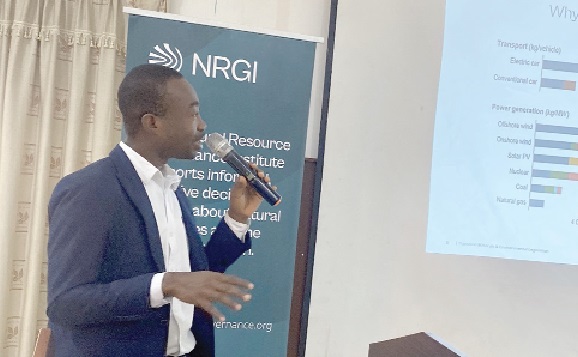
Strengthen mining laws for environmental protection — Expert
EXPERTS are calling on the government to strengthen its environmental laws and enforcement to reduce the environmental and social impacts of mining transition minerals.
As Ghana positions itself as a key player in the global transition to clean energy, the demand for critical transition minerals like lithium, copper, and cobalt is intensifying.
These minerals, essential for renewable technologies such as electric vehicle batteries and solar panels, are seen as the backbone of the green energy revolution.
However, the growing demand presents a dual challenge for Ghana: while mining these resources can boost economic growth, it also threatens to exacerbate existing environmental and social issues.
Mining contributed 8% to Ghana's Gross Domestic Product (GDP) in 2023, with gold exports reaching US$7.27 billion as of August 2024. Currently, two mining leases have been signed in respect of transition minerals and are before Parliament for ratification: a lithium mining agreement with Barari DV Ghana Ltd, a subsidiary of Atlantic Lithium Company (an Australian company) and a bauxite mining lease with Ashanti Bauxite Limited in respect of Nyinahin Block B.
Other agreements are expected in the coming years particularly on lithium, bauxite, iron ore and graphite as exploration and mineral resource estimation continues.
Despite the resource potential and the enormous contribution of mining, the sector has had negative impacts on the environment and local communities.
In his presentation on the topic ‘Race for Transition Minerals: Key Socio-Environmental Concerns’ during a roundtable discussion on Ghana’s transition minerals and its environmental impact in Accra, an Economic Analyst at the Natural Resource Governance Institute (NRGI), David Sefa Adjei, said “about 40% of critical minerals are in countries that exhibit weak or failing governance, may not ensure that mining does no harm and instead delivers benefits to their population.
More than half of the potential reserves are also located on lands where indigenous or peasant groups hold recognised or claimed rights.”
This, he said could lead to ravaging of landscapes leading to deforestation, water pollution and dewatering, adding that “it takes two million litres of water to extract a single tonnes of lithium. But some 50% of global copper and lithium production are concentrated in areas with water scarcity.
35 forest reserves in Ghana are no more according to the Forestry Commission. In Ghana, galamsey menace is causing destruction of water bodies such that 60% of Ghana’s water bodies are polluted in the central region, primarily due to illegal mining activities.”
The event organised by NRGI brought together key stakeholders on environmental laws with respect to mining in Ghana to deliberate on key environmental concerns in mining transition minerals, highlight the gaps in legislations and proffer recommendations to address them.
Addressing challenges
The Director for Mining at the Environmental Protection Agency (EPA), Michael Sandow Ali, acknowledged the challenges mining critical minerals poses to environmental sustainability, social responsibility, and economic development.
He said as part of strategies to address these issues, EPA was expanding its presence across the country, increasing staff, and using satellite and drone monitoring.
Additionally, he said the EPA is enhancing collaboration with stakeholders, focusing on client services, and strengthening the Akoben Programme for environmental performance and public transparency.
“The Mining Department’s activities are cross-cutting in nature and cover a wide range of issues and mineral resources, including critical minerals.
The Department also collaborates with multiple stakeholders as well as its own departments, regional and area offices. We are constantly seeking innovative ways of delivering on our core mandate,” he said.
New administration
As the President-elect, John Dramani Mahama, prepares to take office on January 7, 2025, the Coalition of Civil Society Organisations (CSOs) have issued recommendations for key priorities.
The CSOs are the Africa Centre for Energy Policy (ACEP), Natural Resource Governance Institute (NRGI), Ghana Anti-Corruption Coalition (GACC), iWatch Africa, Revenue Mobilization Africa (RMA), Third World Network-Africa (TWN-Africa), IMANI Centre for Policy and Education, Centre for Extractives and Development (CEDA), Institute of Energy Security (IES), and the Human Environment and Livelihoods Platform Foundation (HELP Foundation Africa).
They are calling for the repeal of the Environmental Protection (Mining in Forest Reserves) Regulation 2022 and the enforcement of mining laws, with investigations into illegal mining and prosecutions of those involved.
The CSOs also urge energy sector reforms, including reducing political interference in State-Owned Enterprises like GNPC and Ghana Gas.
They recommend terminating the Agyapa Royalties Deal and amending the Mineral Income Investment Fund (MIIF) Act for greater transparency in mineral revenue management.
Additionally, they emphasize prudent economic management and fiscal discipline to address the nation’s challenges. The CSOs pledge support for reforms that promote transparency, accountability, and efficiency.
“As you prepare to assume office, we are keenly aware of the constrained fiscal space and significant economic challenges facing our nation. Prudent economic management and fiscal discipline, combined with targeted investment in economic and social priority areas, is imperative.
The coming year demands bold and decisive action to eliminate revenue leakages and ensure the judicious use of our national resources to drive sustainable and inclusive development for all Ghanaians.
The Coalition stands ready to support your administration in implementing reforms that enhance transparency, accountability, and efficiency,” it statement said.